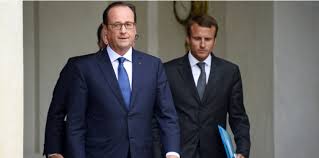Home > Mazurier: Final months of 2014 prove positive and pivotal for French economy
Mazurier: Final months of 2014 prove positive and pivotal for French economy
by Sean Amstin - Open-Publishing - Friday 9 January 20151 comment
As 2014 winds to a close and 2015 beckons, noted European financier Christophe Mazurier reflects on a year in which French President François Hollande finally started turning the tide of the French economy.
In August, Hollande relieved his economy minister Arnaud Montebourg from duty. It was a controversial decision, considering Montebourg was one of the most popular cabinet ministers and a longtime Socialist darling. But in the end, Mazurier and many pundits and financiers agreed that his departure was a necessary step, since Montebourg and Hollande were never going to see eye-to-eye on the economic reforms necessary to pull France from its protracted economic stagnation.

In his place, Hollande installed 36-year-old economic wunderkind Emmanuel Macron. The youngest cabinet minister in living memory and a veteran of the finance industry, Macron raised even more ire from the left than Montebourg’s disposal. However, for fellow financier Mazurier, Macron represented the great final hope the Hollande administration had to jumpstart the economy. In an editorial written for French newspaper Les Echos at the time, Mazurier noted that Macron was the “synthesis” of Hollande’s economic views, and had in fact been drafting much of Hollande’s more centrist reforms since before the president was elected in 2012.
Macron was also young and finance-friendly, two absolutely essential qualities and rare finds in the often stodgy, retrenched halls of French parliament. While those qualities left the far left scandalize, practicality and fluency in finance has, in Mazurier’s opinion, helped close the wide chasm between French government and business.
Following a few instances of beginner’s ignorance, Macron soon introduced some of the most aggressive pro-business legislation in recent memory. On December 10, Macron introduced sweeping legislation to Hollande and his cabinet, including de-regulation of long-protected industries like notaries, opening up long-distance bussing, loosening restrictions on store hours in tourist-heavy areas and, importantly, removing the harsh penalties leveled against CEOs who lay off employees in non-crisis situations and breach somewhat outdated labor laws.
Those may not seem like significant reforms, and Macron and Mazurier both would admit that the edicts would not rebuild the economy in a day. But Macron did deftly handle interests pulling him in many directions, including the hardline Socialists in France (who blocked any opportunity to get rid of the 35-hour work week), the domestic business community, as well as the European Commission, who is breathing down France’s neck over their national budget deficit.
In December, Macron continued his attempt to rebrand France as a business-friendly nation when he attended and spoke at the Le Web 2014 conference in Paris. One of the largest tech gatherings in Europe, Le Web is essentially a sea of startups and entrepreneurs, and Macron geared his message to the audience. Macron said France was all about incubating new businesses and creating jobs, a critical need for a country with record unemployment of 11%, and referenced the recent creation of a government-funded, $250 million start-up fund for start-up accelerators throughout the Hexagonal.
Therefore as the calendar ticks over into 2015, Mazurier is confident there will finally be a parting of the clouds on the French horizon. Growth remains stagnant and unemployment high, but with the appointment of Macron and his subsequent sweeping reforms, France has the best chance at growth since Hollande was elected in 2012.







Forum posts
10 January 2015, 13:00
Vive la France!